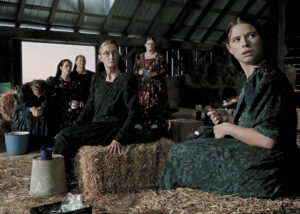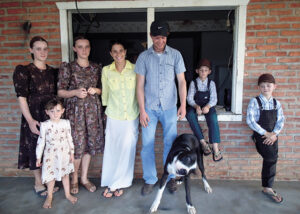From time immemorial—as the biblical story of Ruth and Naomi illustrates—developing friendships and tending relationships have often been a woman’s “go-to, our have-to, our live for,” especially during times of stress. In the current season of stressful change within Mennonite Church Canada, tending relationships may be especially important to the health of the church. Drawing on women’s gifts for making connections can help us thrive rather than divide or shrivel.
That’s the opinion of Marlene Harder Bogard, a long-time friend and ministry colleague from MC U.S.A. Throughout her life, she has helped empower Mennonite women. One way she did that was to immerse herself in a landmark study on friendship among women by a group of psychologists: “Biobehavioural responses to stress in females: Tend-and-befriend, not fight-or-flight” (University of California, Los Angeles, 2000). Following are some of Harder Bogard’s personal highlights from the study:
- Friendships between women shape who we are and who we are yet to be. They soothe our tumultuous inner world, fill emotional gaps in our marriage, and help us remember who we really are. And they may do even more.
- Scientists now suspect that hanging out with our friends can actually counteract the kind of stomach-quivering stress most of us experience on a daily basis.
- Have you ever had a friend call you after a stressful day and say, “I just need to unload . . . or I know you’re there for me”? If you’re a woman, it’s quite likely you have. This corresponds to the study’s findings that women respond to stress with a cascade of brain chemicals that cause us to make and maintain friendships with other women. Women respond with more than a fight-or-flight response. It’s a stunning find that has turned five decades of stress research (90 percent of it on men) upside down.
- In fact, Dr. Laura Cousino Klein, a UCLA professor of psychology, says, when the hormone oxytocin is released as part of stress responses in a woman, it seems to buffer the fight-or-flight response and encourages her to tend children and gather with other women instead. When she actually engages in this tending or befriending, more oxytocin is released, which further counters stress and produces a calming effect. This calming response does not occur in men, says Dr. Klein, because testosterone—which men produce in high levels when they’re under stress—seems to reduce the effects of oxytocin. Estrogen, she adds, seems to enhance it.
- The discovery that women respond to stress differently than men was made in a classic “aha” moment shared by two women scientists who were talking one day in a lab at UCLA. They joked that when the women who worked in the lab were stressed, they came in, cleaned the lab, had coffee and bonded, says Klein. When the men were stressed, they holed up somewhere on their own. This joke actually led the scientists to do extensive research, which arrived at the findings noted above.
For me, these are exciting findings, which mean that, like Ruth and Naomi, women today can bless our faith communities with the calming effect of this God-given gift involving our hormonal stress response of tending and befriending.
As our regional churches take on increased responsibility and ownership of church life, we have new opportunities to use, recognize, celebrate and reap the benefits of this newly named gift.
Mennonite Women Canada and its regional groups want this “tending and befriending” to happen, and we do this by having day-or weekend-long inspirational retreats. For example, MW Manitoba’s annual spring retreat takes place on April 28, 2018, at Charleswood Mennonite Church in Winnipeg, with guest speaker Moira Somers addressing the theme of “resilience.” Tend and befriend.
Elsie Rempel is Mennonite Women Manitoba’s interim chair and the MW Canada treasurer.







Leave a Reply
You must be logged in to post a comment.